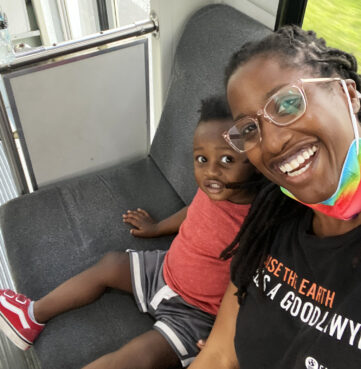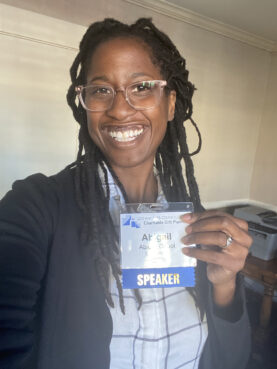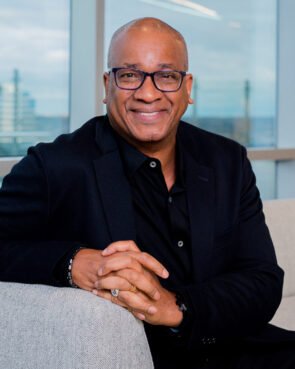
(RNS) — When Abigail Oduol was first invited to join the “undie run” as a junior at the University of California, Irvine, in June 2008, there were fewer than a dozen participants.
But where others saw a kooky and borderline-obscene college tradition on its way out, Oduol saw opportunity.
“Instead of it being people running in their undies just for giggles, why don’t I have people donate the clothes that they are taking off, or bring bags of clothes to donate?” Oduol recalled asking herself in a recent phone interview with Religion News Service. Oduol went on to bring an unprecedented level of organizing to the undie run, recruiting runners from fraternities, sororities and athletic clubs, coordinating the route with local police and adopting a leadership structure to preserve the longevity of the event after her graduation.
By spring of her senior year, there were over 800 participants.
In 2019, Oduol kicked her organizing skills back into high gear, this time as an employee with a lot more to lose. When a Black colleague at Earthjustice, the public interest environmental law organization where Oduol works as a senior development officer, was bullied because of their race, Oduol helped establish an employee resource group called Black at Earthjustice that pushed through an organization-wide anti-bullying and microaggressions policy.
And as the tragic murder of George Floyd opened a window of opportunity for change, Oduol led the charge to make Juneteenth an organizational holiday and gathered a coalition of 60 colleagues to advocate for anti-racist policies at all levels of the organization. As she and other Earthjustice employees took the organization’s anti-racism initiatives up a notch, they did so amid a nationwide acceleration of diversity, equity and inclusion efforts. Between May and September 2020, job search giant Indeed saw a 123% surge in job postings in the DEI industry.
While DEI expert and Global Bridgebuilders founder Skot Welch said much of the initial energy around DEI has subsided, Earthjustice’s anti-racist efforts seem to be here for the long haul. The sticking power of its DEI initiatives is in part thanks to the organizing efforts of Oduol, who sees organizing and anti-racism as integral to her Christian faith.

Abigail Oduol takes a selfie with her son before dropping him off and beginning her day visiting donors. Photo courtesy Oduol
“A part of why this work has been able to go forward is because of relationship building, which is foundational to who we are in Christ,” Oduol said. “Relationship building with others, other image bearers, should be foundational to how we’re viewing all of this.”
Oduol, a 34-year-old mother of two who attends a Baptist church near her home in the Los Angeles area, grew up attending a smattering of white evangelical, Black Baptist and a few multiethnic nondenominational churches throughout California. In 2004, her parents planted Agape Baptist Church in the small town of Patterson, California. A few weeks after they moved into the building, the family arrived to smashed windows, a parking lot spray-painted with racial slurs and a noose with an upside-down cross inscribed on her father’s office door.
“I realized, oh, so racism isn’t just when my classmates touch my hair all the time,” said Oduol. “I wasn’t aware that there was a very active KKK chapter about 20 miles away from us. I wasn’t aware that that happens in California. I thought that kind of racism was reserved for the South.”
Watching her parents establish and run a church without denominational assistance and seeing such a visceral example of racism firsthand set the stage for the racial justice advocate Oduol would later become. In January 2019, Oduol started at Earthjustice on the planned gifts team and quickly began building relationships with her colleagues. A year and a half later, those friendships helped her mobilize in the wake of Floyd’s murder. When white colleagues asked how to support their Black co-workers, offering to buy pizza, Oduol knew she would only settle for real change.
She began organizing with a group of 10 volunteers who spent a weekend drafting a letter requesting off for Juneteenth, framing it as an opportunity for Earthjustice to highlight its solidarity with the Black community. When their request was granted, Oduol revitalized Black at Earthjustice’s policy committee and began brainstorming what structural changes would help dismantle systemic racism embedded in the organization.
“Abigail was a big part of keeping everyone on track and organized. She did everything from scheduling the meeting, writing down meeting notes, circulating next steps and following up with people,” Ernest Parker, workplace operations manager for Earthjustice’s San Francisco office, told RNS about Oduol’s work on the policy committee. “This was in the middle of the pandemic, and everyone’s focus was everywhere. There was a lot of intense feelings. A lot of people were feeling disempowered. The ability to rally the troops was really important during that time.”

Abigail Oduol has worked on improving diversity not only in her own workplace but by speaking on panels about Diversity, Equity and Inclusion. Photo courtesy Oduol
After reviewing the feedback Black employees had submitted to Earthjustice over the previous five years, Oduol and the rest of the policy committee decided to draft a list of demands and opportunities for growth. But instead of submitting the demands directly to leadership, Oduol had other plans.
“I wanted to pull from my background in grassroots community organizing. I think that there’s actually more power in getting collective agreement amongst the other staff than there is of having the CEO or the CBO agree to something,” said Oduol. “We’re all the implementers. So what if we work on something, we start implementing it, we start the conversation, and then once we’ve decided what we want … then we ask to make it into a formal policy?”
To get broad buy-in on the policy recommendations — which included asks for things such as clear pathways for promotions and transparency around how office spaces are distributed — Oduol gathered 60 volunteers (out of roughly 450 employees) who split into three groups of focus: organizational development, talent development and business operations. The volunteers developed a set of recommendations and are in the process of submitting them to be voted on by the Black at Earthjustice group. The group will then request a meeting with human resources to ask for a feasibility report on the recommendations that pass.
“It’s changed the entire conversation within our organization. Our organization is now having all kinds of initiatives. The way we’re looking at work, the way we’re talking about work is different,” Oduol told Jemar Tisby in a recent podcast episode as part of his “Fighting Racism” series done in partnership with RNS. “And we have such a broad base of buy-in that things that seemed radical before, are just normal, just normal ideas that someone can propose in a meeting.”
While Earthjustice’s executive leadership has been generally receptive to these efforts, there has been some internal pushback, including from a previous DEI officer who, Oduol said, preferred trainings and handouts to changing policies and culture. In workplaces across the U.S., Oduol said she has seen a broader backlash to DEI efforts, especially from those who don’t see DEI as lucrative.
“That’s a part of why I spend a lot of my time in the fundraising spaces speaking to other fundraising shops and conferences about how diversity, equity and inclusion doesn’t prevent a nonprofit from still making money,” said Oduol, who called the idea that it’s a financial liability to treat people well a “slavery business model.”
Welch, author of the forthcoming book “Unfractured: A Christ-Centered Action Plan for Cultural Change,” noted that Global Bridgebuilders emphasizes the financial incentives of DEI work to its corporate clients. “We focus on the business imperative. Some organizations are finding out the benefits of having employee retention, stronger recruitment and brand equity in different talent pools around the United States and the world,” he said.
The Rev. Brenda Salter McNeil, a Christian racial justice advocate and associate professor of reconciliation studies at Seattle Pacific University, said that in the faith-based sector, she has seen pushback in the form of unprecedented discomfort around values that were previously seen as a given. Thanks to the woke wars, some Christian groups are questioning whether “racial injustice would be ethical, moral and right,” she said.
When asked what differentiates organizations that have successfully adopted an anti-racist culture from those that have not, Salter McNeil pointed to the biblical figure of Esther, who spoke up at great personal risk to save the Jewish people. McNeil has seen the most effective DEI efforts in places where people like Esther are “brave enough to speak the truth,” regardless of the consequences.
When faced with the presupposition that anti-racism work is “too political” for the workplace, Oduol said she points out that most policies (including those around breastfeeding, for example) are inherently political, because they establish norms and rules. She added that her best advice for those wanting to advance racial justice in the workplace despite the risk of a political label is being willing to get to know people who are unlike them.
Befriending colleagues from all walks of life, Oduolo said, has made her “further lean into my understanding of the imago Dei (the image of God).”
“You can’t organize if you don’t know people.”
This story is part of an ongoing podcast and news series “Fighting Racism” produced by Footnotes with Jemar Tisby and Religion News Service.

